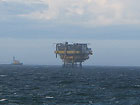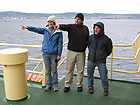

 | |||||||||||||||||
|
|
Journals 2007/2008Mark Goldner
December 6, 2007 52° 31' S, 68° 28' W I write this final entry from sea as we are on our final leg of the cruise; we're out of the Drake Passage, steaming through the Strait of Magellan towards Punta Arenas. We will arrive at Punta Arenas sometime tomorrow (Friday) morning. I leave Saturday to begin the long flight back to Boston.
Tonight was beautiful, with a glorious sunset and much warmer weather than we've experienced all month. The steam up from the Drake was very smooth. Today was spent mostly cleaning out and packing up.
I have been gone from home for just over a month; it feels like a year. Much of that feeling comes from being so far away and from being immersed in something so different from anything I've experienced before. Some of that feeling also comes from being in a place where the pace is much slower and repetitive than I'm used to. In addition, we all see the same faces and the same scenery; and there's only so many places to go on the ship for a change of pace. Don't misunderstand me - the experience has been fascinating and worthwhile. I've learned a great deal from this experience. I have a very good idea of how physical oceanographers go about their business. I've learned a bit about ocean currents and what drives large masses of water in the ocean. I've learned a lot about the variety of instruments used to study the movement of ocean water and the physical characteristics of ocean water. It's amazing (and, a bit eerie!) that we've left an array of 38 instruments many thousands of feet below the surface of the ocean that sit quietly collecting data - well, not so quietly, as every few minutes each one sends a pinging sound up to the surface of the ocean and "listen" for it's reflected echo. For 5 years these devices will do their thing, collecting data about the ocean water. As an observer, it's been amazing for me to watch the way the team goes about their tasks with incredible thoughtfulness about their work and for each other. As I have written a few times, the professionalism and cooperation of this group of scientists is quite admirable. I've learned about a world I never much thought about before, the world of people who devote their lives to being at sea and understanding how the ocean works. I'm constantly impressed by the array of skills that the technical support crew brings with them: from boating skills - an encyclopedic knowledge of knot-tying skills and using a winch or crane - to science skills - such as understanding the science behind CTD tests and other water-testing equipment and methods. The technology behind the science on a ship like this is sort of dizzying for a newcomer like myself. Someone needs to keep the gravity meter working, the CTD-computer interface up and running, the "autosal salinometer" in working order, not to mention the computer servers maintained. At the same time, the ship-board ADCP (acoustic Doppler current profiler) and sonar multi-beam mapping system need to be running smoothly. And we have become dependent upon a reliable email and phone system! Of course I haven't really touched upon the array of navigational tools and instruments that the ship's crew rely on to keep the boat moving in the right direction in heavy seas and rough weather, or keep the boat stationary while experiments are being conducted (while the sea conspires to toss the boat away from the desired location).
The highlight of the trip was certainly seeing the continent of Antarctica. I wish we could have spent more time there, but it was worthwhile to even catch a glimpse of that most spectacular and foreboding continent. It's strange to realize that I've spent a very intense month with the same people, who I've gotten to know quite well. In all likelihood, I will not see most of them ever again. A strange thought. I do hope to follow the progress of this long experiment and be able to share what they learn with my students in the future.
Although I have enjoyed this experience, I think I've discovered that a life at sea is not for me. In addition to the long separation from those I love, being confined to a single vessel would take me a lot more getting used to. Perhaps if I had entered this world 15 years ago - young, single and without a family - I might have felt differently. The hardest thing for me, clearly, was being away from my family. I have missed my family terribly, and most of all I am eager to see them and be with them again. We are a family unaccustomed to being apart from one another, and I have found that part of the experience to be much more difficult than I thought. I have been warned that coming home after a long time at sea can sometimes be more difficult than you expect. I wonder what things will pop up that will be difficult to re-adjust to. I wonder if I have become more used to life on a moving ship than I realize. What will my first steps back on land feel like? I wish to thank publicly the people who made this experience possible for me. First, I want to thank Kathy Donohue, Randy Watts and Teri Chereskin for allowing me to participate in their research and for taking good care of me through the entire process. I also want to thank the ship's crew, whose capable hands delivered us safely through the cruise, and who have beared with me as I asked an endless series of questions (the kind that only a landlubber would ask!). A big thank you to Gail Scowcroft and Andrea Kecskes from the ARMADA project, who made this happen for me (and for all the other ARMADA teachers!); and, of course the National Science Foundation for supporting these experiences. I wish to thank several people at the Heath School: Principal Milly Katzman, who has enthusiastically supported my leaving the school for 5 weeks to participate in this experience; you understood right away the value that this experience would have for the students; My intern Heidi O'Donnell, who has taken on much more than would be expected of a student teacher by completely taking over my responsibilities; she has done an outstanding job; Technology teacher Matt Durant for faithfully maintaining this blog so you all could share in my experiences. Finally, I owe the biggest thanks to my family for bearing with my long absence and my anxiety before I left. I know it has not been easy for me to be gone!
This will be my last report from sea. I intended this journal mostly for my 7th and 8th grade students, but I understand that a much larger audience is reading this blog. Apparently the readers not only include my students, my family and my friends, but many others connected to those on the ship. I do hope you have enjoyed reading about my experiences, and I'm glad I was able to help give you a small taste of what life on research vessel is like. |
||||||||||||||||




